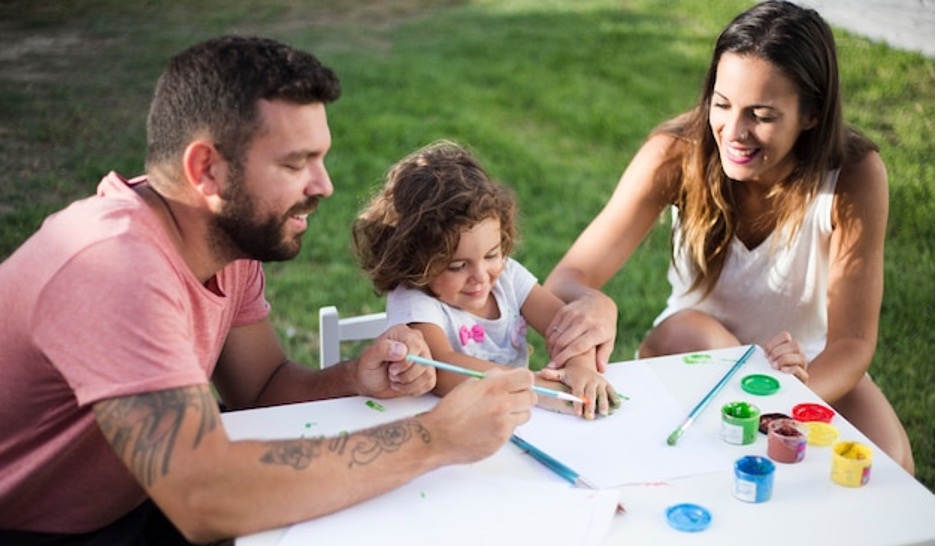“Feelings of worth can flourish only in an atmosphere where individual differences are appreciated, mistakes are tolerated, communication is open, and rules are flexible – the kind of atmosphere that is found in a nurturing family.”
Communicate openly and honestly with each family member
- Encourage open dialogue: Create an atmosphere where everyone feels comfortable expressing their thoughts, feelings, and concerns without fear of judgment or criticism.
- Active listening: Pay attention when someone is speaking, maintain eye contact, and show a genuine interest in the conversation.
- Be honest: Foster an environment where honesty is valued. Encourage family members to express their thoughts and emotions truthfully, respecting each other’s views.
- Resolve conflicts peacefully: Teach healthy problem-solving, compromise, empathy, and forgiveness skills.
By implementing these strategies, you can promote open channels of communication that will strengthen relationships and create a more supportive environment for all members. For more information or assistance on dealing with divorce in the context of maintaining a supportive family environment, please contact paonlinedivorce.com
Establish and follow a daily routine that includes quality time together
- Set aside time for the family: designate a specific time during the day or week when all family members can come together for activities, discussions, or just some quality time together.
- Plan regular meals together: This provides an opportunity for conversation, communication, and bonding. Aim to have a meal together at least once a day when everyone sits together without distractions.
- Share hobbies or activities: Find common interests that the whole family can engage in. This could include playing sports, going on hikes, cooking or baking together, or even starting a book club.
- Prioritize uninterrupted communication: During scheduled family time, put down your electronic devices and focus solely on each other. This will foster deeper connections and better communication.
By incorporating these practices into your daily routine, you can strengthen the relationships in your family while creating a supportive environment for everyone involved.
Practice active listening and empathy
- Be present: When participating in a conversation, make a conscious effort to stay focused. Put aside distractions such as phones or other devices, and give your undivided attention.
- Show empathy and understanding: Seek to understand the perspectives and emotions of others without judgment. Put yourself in their shoes and try to see things from their perspective.
- Validate feelings: Acknowledge and validate the emotions expressed by each family member. Let them know that their feelings are heard and understood, even if you do not agree with them.
- Practice active listening when someone is speaking by maintaining eye contact, nodding in agreement, or showing other signs of interest.
By practicing active listening skills and showing empathy for one another, you can create an environment where open communication thrives. This helps strengthen family bonds and creates a safe space for discussion.
Encourage individuality and personal growth in the family
- Create a supportive environment for personal interests: Encourage each family member to pursue their hobbies, passions, and interests. Create a space in the family dynamic where everyone feels supported in exploring their individuality.
- Recognize and celebrate each family member’s accomplishments, big or small, to foster a sense of pride and encourage personal growth.
- Accept differences in opinions, beliefs, and attitudes within the family. Respect the unique qualities of each person and encourage open discussions that foster understanding and acceptance.
- Provide opportunities for self-reflection: Create an environment where self-reflection is valued. Encourage family members to engage in self-reflection, set personal goals, and support them on their path to growth.
By creating an environment that values individuality and supports personal development, you create a supportive atmosphere that allows each family member to grow in their own way. Remember that even if there are challenges along the way, such as deciding to divorce or going through the divorce process, you can turn to resources like paonlinedivorce.com for help.

Foster a culture of respect, kindness, and appreciation for each other
- Lead by example: Show respectful and kind behavior toward each family member, treating them with compassion, understanding, and gratitude.
- Encourage open dialogue: Create a safe space where everyone feels comfortable expressing their thoughts and concerns without fear of judgment or criticism. Create an environment that values different opinions and perspectives.
- Practice gratitude: Regularly express appreciation for each other’s efforts, contributions, and qualities. This can be done through verbal affirmation or small gestures of kindness.
- Establish clear boundaries: Set the guidelines for respectful communication in the family. Teach children to use the right language and tone when speaking.
By fostering a culture of respect, kindness, and gratitude in your family, you create an atmosphere that supports strong relationships and also constructively addresses any potential grounds for divorce.
Create opportunities for shared decision-making and problem-solving
- Create a collaborative environment: Encourage family members to work together as a team when making decisions or solving problems. Emphasize that everyone’s input is valuable and should be considered.
- Hold regular family meetings: set aside time to discuss important issues such as house rules, schedules, or any problems that may arise.
- Provide guidance on how to deal with difficulties and problems constructively.
- Model healthy conflict resolution: Demonstrate effective ways to resolve conflicts in the family. Show respect for different opinions and guide family members to find fair and equitable compromises.
By creating opportunities for shared decision-making and problem-solving in your family, you promote a sense of ownership and unity among your family members. It also provides a pathway to eliminate any grounds for divorce or other difficulties.
Prioritize regular family meals to promote communication
- Make family meals a priority: Set aside time in your schedule for regular family meals together. Treat them as important meetings that should not be missed.
- Create a welcoming atmosphere: set aside a space where everyone can gather comfortably. It can be a dining room, kitchen table, or even a picnic area outdoors.
- Involve everyone in meal preparation: Encourage every member of the family to participate in the planning and cooking process. This fosters a sense of teamwork and shared responsibility.
- Establish mealtime rituals: Develop traditions or rituals around meals, such as sharing highlights of the day or discussing current events. These rituals promote communication between family members.
By prioritizing regular family meals, you provide opportunities for meaningful connections and conversations. This strengthens family relationships and creates shared memories. For more guidance on maintaining healthy family ties or dealing with divorce in this context, please visit paonlinedivorce.com
Support each other’s goals, dreams, and aspirations
By doing so, you create an environment that fosters growth, fulfillment, and unity. This allows each person to thrive and also strengthens the bond between family members. For more guidance on how to create a supportive family environment during challenging times such as divorce, visit paonlinedivorce.com

Maintain a healthy work-life balance
- Prioritize self-care: Encourage each family member to take care of their physical, emotional, and mental well-being. This may include participating in activities that promote relaxation and reduce stress, such as exercise, hobbies, or mindfulness practices.
- Set boundaries between work and personal life. Encourage all family members to disconnect from work during designated family time or rest periods.
- Plan regular leisure activities for the whole family. This can be a weekend walk, a game night, or just spending time together without any specific plans.
- Promote open communication about the workload: discuss responsibilities in the family and ensure that tasks are fairly distributed. This helps prevent overloading with excessive work and also creates a sense of shared responsibility.
By maintaining a healthy balance between work, play, and relaxation in your family dynamic, you create an environment that supports overall well-being and reduces potential grounds for divorce related to stress or exhaustion.
Celebrate achievements together as a family
- Recognize and celebrate achievements: Set aside time to recognize and celebrate individual family accomplishments, big or small. This can include academic success, personal achievements, or goals.
- Create rituals or traditions that celebrate special occasions or achievements. This could be an annual celebration of birthdays, anniversaries, graduations, or even creating a gratitude jar where everyone writes down something, they are thankful for each day.
- Show support and encouragement. Offer words of encouragement and support when someone is working toward a goal or facing a challenge.
- Share joyful moments: Celebrate as a family when someone experiences happiness or success. This creates a positive atmosphere and strengthens the bond between family members.
By celebrating achievements together as a family, you create shared memories and strengthen relationships. It also provides an opportunity to eliminate any grounds for divorce by promoting open channels of communication during difficult times as well as moments of triumph.




Comments are closed.